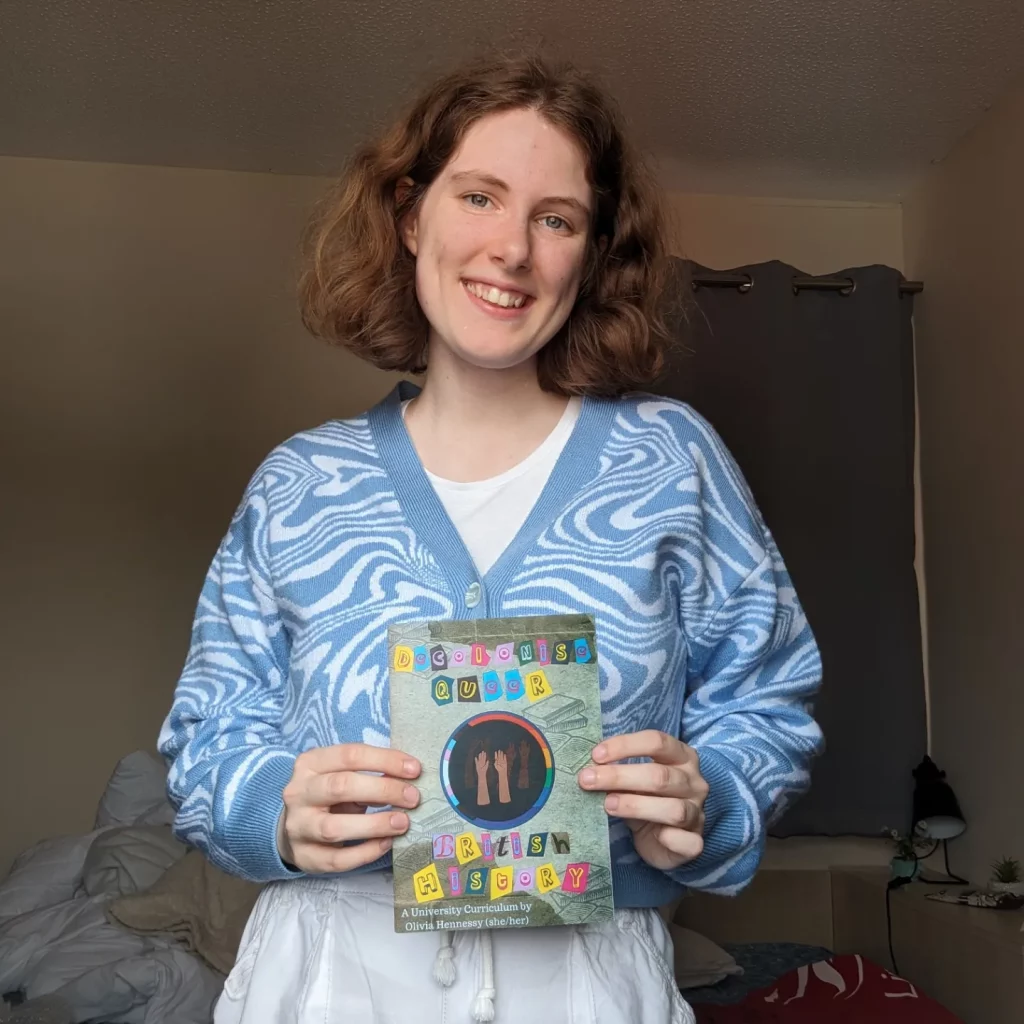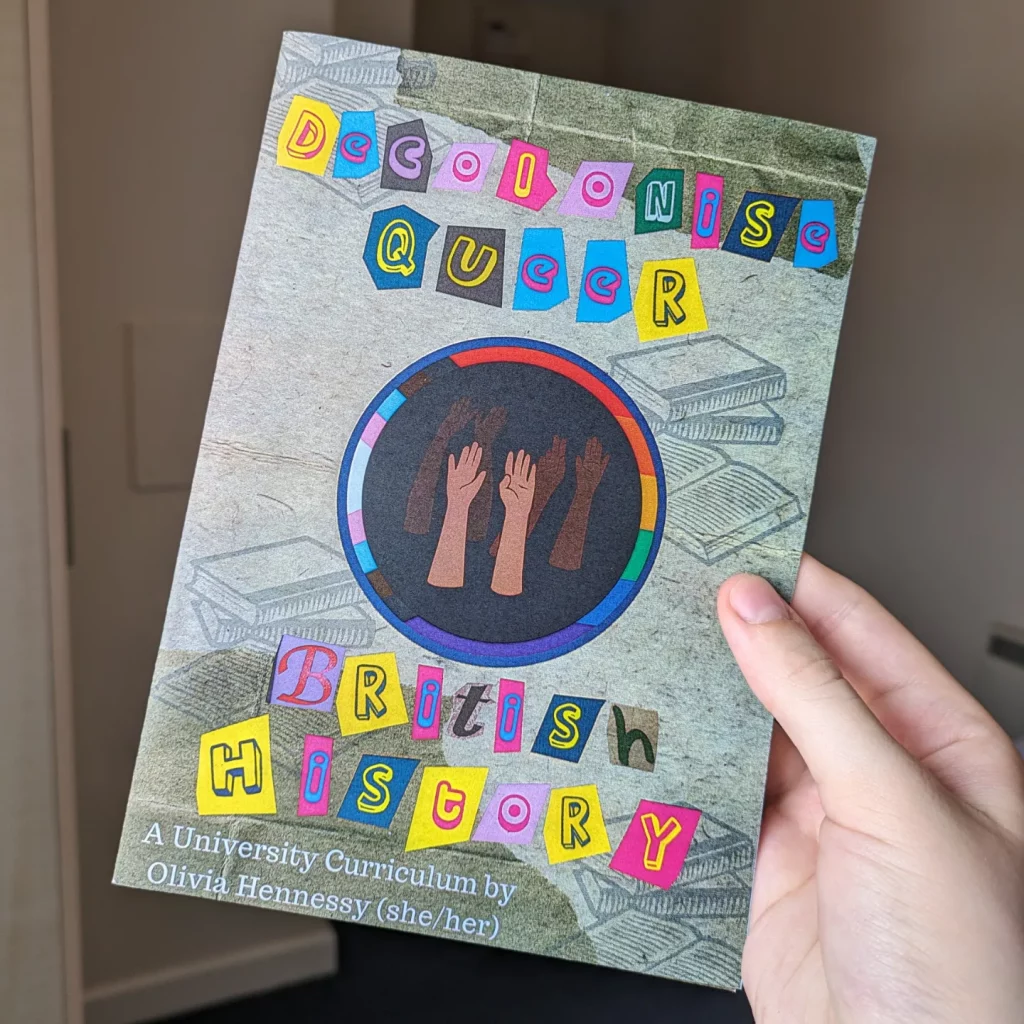Olivia Hennessy (she/her) ‘Decolonising Queer History in Britain’
My name is Olivia Hennessy, and I recently completed my third year of BA (Hons) History. I am pursuing a Master’s degree at the University of Leicester in September, specifically Museum Studies. From this, I made the decision to involve myself in the Decolonising @ Lincoln Project to broaden my understanding of decolonisation in educational and curatorial practises.
The Decolonising@Lincoln Project (D@L) highlights how the colonial past has a negative impact on our present and unjustly excludes particular groups of people, ideas, and practices. In order to reintegrate them into our teaching, learning, research, and administrative practices, it aims to reclaim suppressed voices and excluded types of knowledge and practice.

I decided to specifically focus on establishing a university syllabus about decolonising Queer History in Britain as a new approach. This syllabus has been visually broken down through a zine alongside a reading list implemented on the University of Lincoln library, including readings and films produced by people of colour.
The link for the list is here: Decolonising Queer History in Britain
Additionally, I produced a Word document describing how the syllabus may use creative assessments rather than essays. Since essays are notoriously challenging, having more creative assessments will allow students, and students from disadvantaged backgrounds, to approach decolonising Queer History in new and innovative ways. Podcasts and interviewing activists are included as the proposed assessments, enabling students to develop their skills in public history and communication.
This project addresses the D@L agenda to challenge the White Euro-American dominance of knowledge production by uncovering marginalised knowledge that is missing from subject disciplines and practices.
The aim of the project is to understand Queer British History through a decolonised perspective, assessing Black and Asian British queer identities, desires, and lives through films, documentaries, literature, and photographs. Specifically, Queer People of Colour and Asians in Twentieth Century Britain are the chosen marginalised groups for the syllabus. Some of the academics incorporated into this proposed syllabus are Ronald Cummings, Kobena Mercer, Jason Okundaye, Ajamu X, Topher Campbell and more. These academics give a comprehensive understanding of how decolonising queer history can be associated in Britain.
I decided to work on the proposed project as decolonisation is an important topic that needs to be discussed between students and staff more in our university community, particularly how intersectionality should play a significant role in decolonising the curriculum. I would like to conduct more research on this type of syllabus, especially how it may be applied to subjects other than history. This notion was inspired by Sabah Choudrey’s book ‘Supporting Trans People of Colour’ where Choudrey argued that Black Queers had to fight twice as hard to be ‘seen, heard, and loved.’ (14) Choudrey is a black transgender individual who shares their own contemporary experiences of feeling alienated as black and transgender. The research, education and content for this syllabus is relevant since racial and ethnic Queer communities continue to face discrimination in the United Kingdom.
The outcome of the zine was incredible! I have had a lot of interest from students and staff for either a paper or online copy. This demonstrates how important it is to decolonise Queer History through the university curriculum!

What I found compelling was Dr Simon Obendorf’s feedback on the reading list. Obendorf leads the Decolonising@Lincoln project and also specialises in gender, sexuality and decoloniality. He mentioned that this is very distinctively British and mostly Black British approach but very impressive. Obendorf also commented that Asia is more than just South Asia and looking at global history more generally. He gave a fantastic suggestion to look at the colonial legacy of anti-gay laws worldwide. This feedback has made me consider how to produce a global approach to Decolonising Queer History, which will be undertaken when I pursue my Master’s in Museum Studies at the University of Leicester.
Overall, D@L has enabled me to think more broadly about approaching Queer History through a decolonised lens. This opportunity is part of a progression towards my future studies at Leicester, described by Obendorf as ‘an awesome trajectory – a great success story’ and that a ‘showcase of decolonial work would be a great idea’. Racial and ethnic queer lives and histories should be seen and heard all year round!